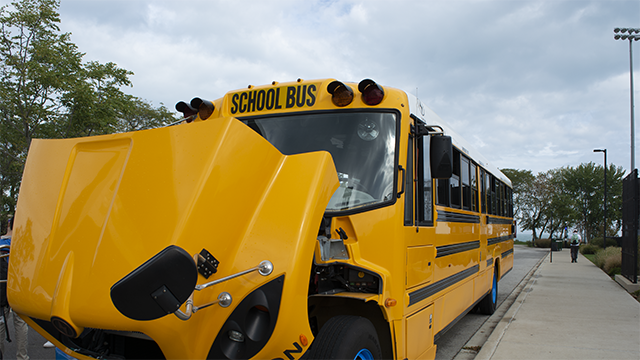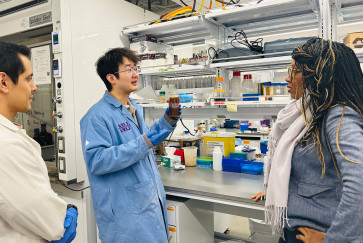With help from Northwestern University students, the nationwide Head Start early childhood education program will acquire its first electric school buses and charging infrastructure in Evanston. Compass Transportation, which provides local transit to the Evanston program, received part of a $4.2 million grant from Gov. J.B. Pritzker’s Driving a Cleaner Illinois Program as the result of a proposal generated by student sustainability fellows.
This marks the first U.S. Department of Health and Human Services Head Start program in the country — which promotes school readiness for young children from low-income families — to be served by an electric bus, a move that could translate to significant health benefits for communities exposed to higher levels of air pollution. The greater Chicago area is one of the top 16 metro regions that would most benefit from electric vehicles.
According to the American Lung Association, transitioning to electric buses by 2050 could prevent 6,300 premature deaths; 93,000 asthma attacks; and 416,000 lost workdays, especially in underserved communities of color that are disproportionately impacted by pollution.
“We are thrilled that our students were able to facilitate positive change in the community while gaining hands-on experiential learning,” said Holly Benz, who oversees the fellows and serves as the director of the Master of Science in Energy and Sustainability (MSES) program at Northwestern. “The result is a win for the students and for local residents.”
The Northwestern Student Sustainability Fellowship began last summer when the University entered a five-year partnership with Ameresco, Inc., a leading clean technology integrator specializing in efficiency and renewable energy. The partnership guaranteed funding toward an annual program that provides a tuition stipend for 16 students each year.
Initiatives like the partnership and fellowships have positioned Northwestern as a leader in sustainability and green energy, exemplified through several EPA ENERGY STAR Sustained Excellence Awards, an exemplary collegiate sustainability rating, and a new award, granted today through the Department of Education.
The Green Ribbon Schools Award, announced annually on Earth Day, is presented to schools that reduce environmental impact and costs; improve the health and wellness of schools, students and staff; and provide effective environmental and sustainability education.
Pinky Friedman, director of Compass Transportation, said Northwestern students were integral to securing the grant.
“I knew about these grants and had previously attempted to win one,” Friedman said. “But the students really put things over the top by doing a lot of the legwork. They reached out to bus manufacturers. They reached out to the utility company. They reached out to other districts.”
The cross-disciplinary graduate team — coming from backgrounds ranging from oil to chemical manufacturing — showed that electric buses also hold immense opportunity through excess energy stored in batteries that can be deployed for other uses.
“Historically Compass just had a diesel school bus that would just sit there all day,” said J.J. Sarsfield, a sustainability fellow and MSES student. “School buses are the optimal vehicles to do vehicle-to-grid because they have bigger batteries, are used so infrequently and as more people adopt them, they can generate more revenue.”
Typical electric passenger vehicle battery storage ranges between 20 to 100 kWh. The battery capacity of a typical electric school bus, however, is significantly larger — about 210 kWh — equivalent to the amount of energy needed to power seven homes in the Evanston area for a full day. Since school buses are only used approximately 10% of the year, they are a huge source of untapped energy. Using excess energy from electric school buses would increase the reliability of the local power grid, which is rated as one of the top issues for nationwide electric infrastructure.
Northwestern supports a cleaner and more resilient power grid in its operations as well. Enabled by a 15-year partnership between the University and Clearway Energy, one of the largest developers of clean energy in the U.S., Northwestern’s long-term commitment will enable the development and construction of 16 community solar projects across seven Illinois counties. The projects generate clean renewable energy for the surrounding communities and bring green jobs to the Chicagoland area. Once completed, power generated from Clearway’s project portfolio will be equivalent to removing 12,000 cars from the road each year.
The team hit a wall only when they bumped into existing policies and regulations — but saw that things were moving in the right direction. For now, said Sarsfield, they’re focused on deploying pilots to demonstrate vehicle-to-grid capabilities, like in the bus they’ll introduce soon in Evanston.
While Head Start may be the first Evanston program to access a bus — and the first Head Start program in the country to access a bus — they likely won’t be the last in either category. Projects that both master’s students and fellows are working on will continue to bolster laws and infrastructure changes that benefit the city of Evanston in the long term.
“We believe that in this field, tactical, on-the-job experience is critical,” Benz said. “We’ve been very intentional about what we want to teach the students, and the practicum is vital to bringing this to life in an applied way.”
This spring, students will work on projects, including iron-based long duration storage and workforce development with the City Colleges of Chicago, innovative waste management for Northbrook, Ill., carbon farming and biodiversity in the Midwest, and small-scale nuclear energy.


